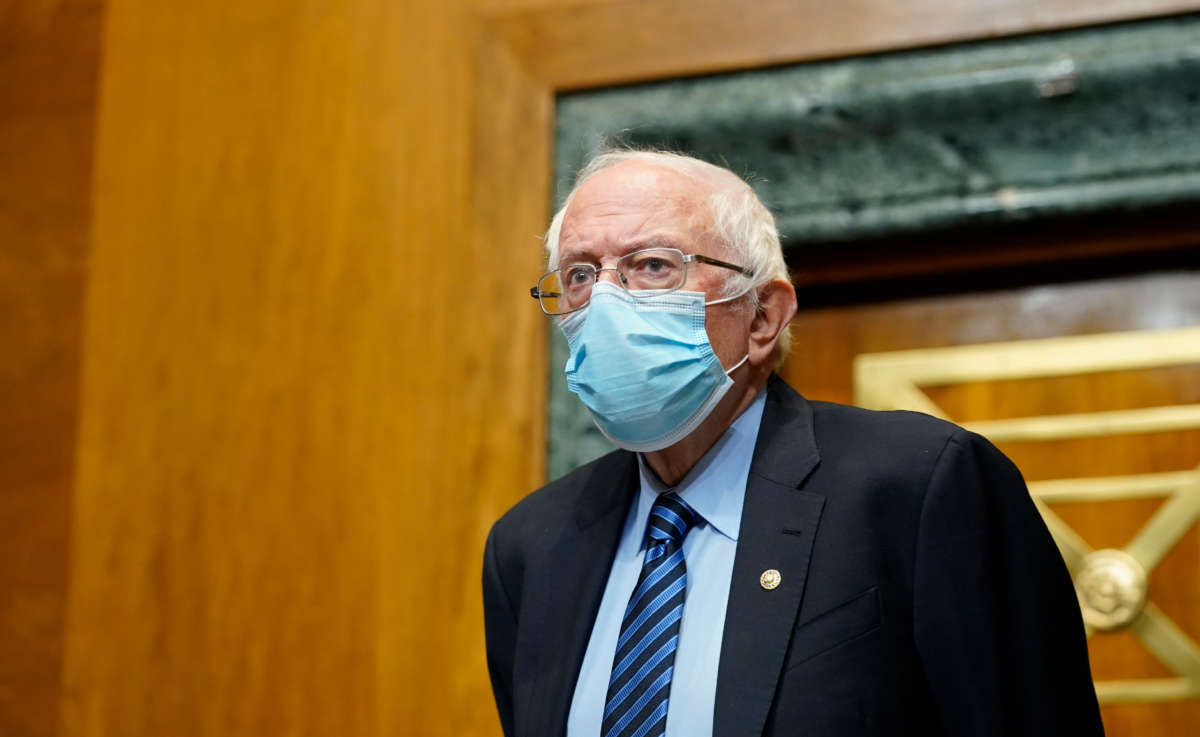Sen. Bernie Sanders (I-Vermont) and several other Democratic lawmakers are lambasting a decision by the Senate parliamentarian, a nonpartisan referee in that legislative body, who determined on Thursday that a provision to raise the minimum wage to $15 an hour in the COVID economic relief package does not align with the rules for the reconciliation process.
But while Democrats appear upset over the decision, the party may be disunited on what path they should take next to raise the minimum wage.
Senate Parliamentarian Elizabeth MacDonough determined that including the wage raise in the $1.9 trillion relief bill did not comport with Senate rules. If the provision is not included in the package, which is set to be voted on soon, any hopes for raising the wage to $15 an hour would require a standalone bill, pending no challenges come about to MacDonough’s decision.
It would be harder to garner votes to pass a separate bill, as it would require 60 votes in the Senate to overcome threats of a filibuster from Republicans and even some centrist Democrats.
In a statement regarding the decision by MacDonough, the White House said that President Joe Biden, who advocated for inclusion of the $15 minimum wage in the bill, was “disappointed,” but also believed Congress should “move quickly to pass” the relief package, which includes $1,400 payments to every American.
Other Democratic leaders appeared to be expressing similar sentiments. Senate Majority Leader Chuck Schumer’s statement about the decision showed no signs of plans to fight MacDonough’s conclusion.
“We are deeply disappointed in this decision,” Schumer said. “We are not going to give up the fight to raise the minimum wage to $15 to help millions of struggling American workers and their families. The American people deserve it, and we are committed to making it a reality.”
Sanders wrote in his own statement that he was in strong disagreement with the parliamentarian’s ruling, believing that the wage raise was in line with the rules of reconciliation.
“The [Congressional Budget Office] made it absolutely clear that raising the minimum wage to $15 an hour had a substantial budgetary impact and should be allowed under reconciliation,” he said in his statement.
Sanders also pointed out that polling on the subject demonstrated Americans overwhelmingly want a $15 an hour minimum wage. With the president, the House, and possibly the Senate in agreement with the idea, there was no excuse not to pass it, he said.
“Yet because of the archaic and undemocratic rules of the Senate we are unable to move forward to end starvation wages in this country and raise the income of 32 million struggling Americans,” Sanders added.
House Speaker Nancy Pelosi (D-California) also blasted the decision from the parliamentarian, writing in her own statement that the House would still pass a reconciliation bill with the wage raise included.
“House Democrats believe that the minimum wage hike is necessary,” she said. “Therefore, this provision will remain in the American Rescue Plan on the Floor [on Friday].”
Rep. Pramila Jayapal (D-Washington) wrote a series of tweets criticizing the decision, too.
“Let’s be clear: raising the minimum wage is COVID relief. The White House and Senate leadership can and should still include the minimum wage increase in the bill,” Jayapal said. “We can’t allow the advisory opinion of the unelected parliamentarian to stand in the way.”
There are ways to get around the parliamentarian’s decision — indeed, Vice President Kamala Harris has the authority to overrule MacDonough’s conclusion. But so far, it’s unclear whether Harris will take that route or not, and the White House has not signaled what it plans to do on the matter. There has not been a move to overturn a Senate parliamentarian’s decision since the 1970s.
Jayapal also called for reforms to the Senate as a result of the parliamentarian’s conclusion in the matter.
“The ruling only makes it more clear that the Senate must reform its archaic rules, including reforming the filibuster to allow populist and necessary policies like the $15 minimum wage to pass with a majority of the Senate,” she said.
Join us in defending the truth before it’s too late
The future of independent journalism is uncertain, and the consequences of losing it are too grave to ignore. We have hours left to raise the $12,0000 still needed to ensure Truthout remains safe, strong, and free. Every dollar raised goes directly toward the costs of producing news you can trust.
Please give what you can — because by supporting us with a tax-deductible donation, you’re not just preserving a source of news, you’re helping to safeguard what’s left of our democracy.
